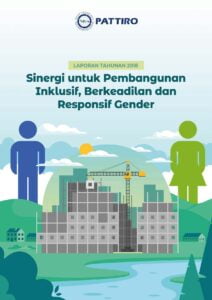
Gender Responsive Planning and Budgeting / PPRG (Gender Responsive Planning and Budgeting) is a strategy that is believed by various parties at the national and global levels to be quite effective in efforts to implement gender mainstreaming strategies in development.
The initial foundation for gender mainstreaming in development in Indonesia began in 2000 with the issuance of Presidential Instruction (Inpres) Number 9 of 2000 concerning Gender Mainstreaming (PUG) in National Development. Along the way, the implementation of the gender mainstreaming strategy was sharpened in the realm of Gender Responsive Planning and Budgeting (PPRG) which officially began at the Ministry/Institution level with the issuance of PMK No. 109/PMK.02/2009 concerning Guidelines for Compiling and Reviewing Work Plans and Budgets of State Ministries/ Institutions and Compilation, Review, Ratification and Implementation of the Entry List for Implementation of the 2010 Fiscal Year Budget. At the regional level, PPRG is regulated in Permendagri No. 67 of 2011 concerning Guidelines for Implementation of Gender Mainstreaming in the Regions. To accelerate the implementation of PPRG, in 2012 the government issued a Joint Circular Letter (SEB) of 4 Ministers concerning the National Strategy for Accelerating PUG Through PPRG, consisting of the Minister of Finance, Minister of Home Affairs, Minister of National Development Planning/Head of Bappenas and Minister of Women's Empowerment and Child Protection .
Although the government only officially issued regulations related to PPRG in 2009, PATTIRO and several other non-governmental organizations have started efforts to promote gender responsive budgeting (ARG) at the local level since 2002. During this time, PATTIRO has played a role in implementing PPRG. . The intended role includes advocating gender-responsive budgets to encourage this
budget reallocation; strengthening the role of the community at the local level; conducting policy studies and analysis; provide technical assistance; and participate actively as representatives of civil society in policy formulation and implementation. PATTIRO also collaborates intensively with KPPPA and various other development partners who pay attention to PPRG.
PATTIRO's contribution continues to this day and adapts to various other relevant policies, such as the issuance of Law Number 6 of 2014 concerning Villages. This role has also developed along with Indonesia's relative prominence in implementing PPRG, thus attracting interest
other countries to learn from our country. One of them is from the Ministry of Women's Empowerment and Poverty Reduction of the Republic of Fiji. Through collaboration with the Ministry of KPPPA, the Fiji delegation carried out a series of capacity building activities and provided technical assistance in implementation
PPRG in Fiji based on lessons learned from the implementation of PPRG in Indonesia.
PATTIRO's involvement is in line with one of the key prerequisites in implementing PPRG, namely public participation. As a component of civil society, PATTIRO actively participates in implementing PPRG at various levels, starting from the village, regional, national
to regional.
[__wpdm_package id='8118']
